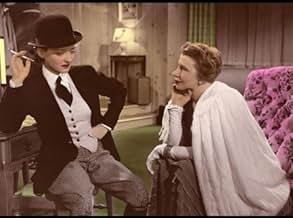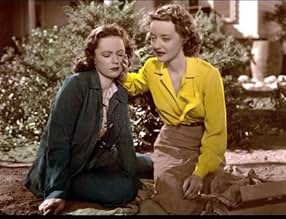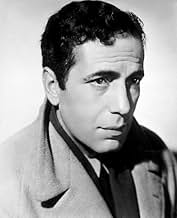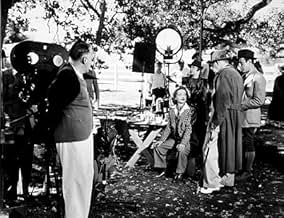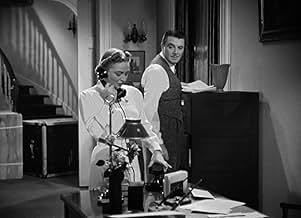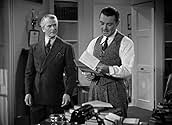AVALIAÇÃO DA IMDb
7,4/10
13 mil
SUA AVALIAÇÃO
Uma jovem socialite é diagnosticada com um tumor cerebral inoperável, e deve decidir se viverá ou não seus últimos dias com dignidade.Uma jovem socialite é diagnosticada com um tumor cerebral inoperável, e deve decidir se viverá ou não seus últimos dias com dignidade.Uma jovem socialite é diagnosticada com um tumor cerebral inoperável, e deve decidir se viverá ou não seus últimos dias com dignidade.
- Direção
- Roteiristas
- Artistas
- Indicado a 3 Oscars
- 5 vitórias e 4 indicações no total
Black Ace
- Judith's Horse
- (não creditado)
Marian Alden
- Judith's Friend
- (não creditado)
Wilda Bennett
- Judith's Friend
- (não creditado)
Diane Bernard
- Lucy - a Servant
- (não creditado)
- Direção
- Roteiristas
- Elenco e equipe completos
- Produção, bilheteria e muito mais no IMDbPro
Avaliações em destaque
When Bette Davis was in ball buster mode, watch out!! But when she decided to suffer nobly, she could suffer with the best of them.
In "Dark Victory," Davis plays a woman dying from the deadliest of deadly diseases---the vague, unnamed illness that beautiful actresses died of in movies from the 1930s. The symptoms never seem to be the same, but they're always tear-inducing. Here, they make Davis go blind and we know when the disease is getting worse because a fuzzy black halo begins to appear around the edges of the frame.
Actually, this movie is a rather pale companion to the ultimate Davis melodrama, "Now, Voyager." But it has perhaps my favorite line ever delivered in a Bette Davis movie. She's found out that her illness is fatal, and she's at dinner with the doctor who has kept this from her to protect her fragile soul. When the waiter comes to take her order, she says, "How about a nice big helping of..." pause, as she throws the most withering of withering stares at her companion ..."prognosis negative." That should really be on a bumper sticker somewhere.
As for the other actors.....wait, other actors? No one watches a Bette Davis movie to see other actors. I'm not even sure there were any other actors in this movie.
Grade: B
In "Dark Victory," Davis plays a woman dying from the deadliest of deadly diseases---the vague, unnamed illness that beautiful actresses died of in movies from the 1930s. The symptoms never seem to be the same, but they're always tear-inducing. Here, they make Davis go blind and we know when the disease is getting worse because a fuzzy black halo begins to appear around the edges of the frame.
Actually, this movie is a rather pale companion to the ultimate Davis melodrama, "Now, Voyager." But it has perhaps my favorite line ever delivered in a Bette Davis movie. She's found out that her illness is fatal, and she's at dinner with the doctor who has kept this from her to protect her fragile soul. When the waiter comes to take her order, she says, "How about a nice big helping of..." pause, as she throws the most withering of withering stares at her companion ..."prognosis negative." That should really be on a bumper sticker somewhere.
As for the other actors.....wait, other actors? No one watches a Bette Davis movie to see other actors. I'm not even sure there were any other actors in this movie.
Grade: B
Bette Davis always cited this as her favourite role: it is probably on a par with Margo Channing in ALL ABOUT EVE as the part which fans identify with as definitive Davis. Naturally, this 1939 film will look a little musty, corny and cliched to modern day viewers, but the poignant sincerity in which Davis instilled via her magnificent performance still has the ability to leave the viewer in helpless tears: you can be dumbfounded to think that something so obviously aimed at your tear ducts could succeed to induce the flow so completely and spontaneously! The role is based upon a 1934 play in which Tallulah Bankhead flopped. The character of Ann King was written especially for the film by director Edmund Goulding: as a kind of Greek Chorus so Judith wouldn't have to complain about the inevitable. Geraldine Fitzgerald, in her American film debut, does a wondrous job with the part of Ann: a beautifully etched supporting performance. As Michael O'Leary, Humphrey Bogart is unfortunately inept in the Irish brogue department (why couldn't they have simply cut out the accent?) and George Brent is adequately wooden as Dr. Frederick Steele whom Judy marries. Davis slams through a gooey collection of cliches in her nerviest style during the early segments but her metamorphasis into a vibrantly humbled married woman is quite a striking contrast to the selfishly brazen spoiled heiress: truly a multi-faceted performance. Ronald Reagan gets to play Alec, one of Judy's drunken swains, and Cora Witherspoon is memorable as the snotty Carrie. The last twenty minutes of the film are expertly crafted and timelessly tear-jerking: the movie sold more kleenex than any other of its day.
"Dark Victory" features a superb performance by Bette Davis, portraying Judy Traherne, a socialite struggling to come to terms with terminal brain cancer, a diagnosis that ironically brings her the greatest joy of her life, as she falls in love with and marries the doctor who diagnosed her, also superbly played by George Brent.
There's nothing really to dislike in this movie. The basic point is simple to figure out: whatever darkness you may face, make the best of it and live life to the fullest, because even in darkness there may be victory. The supporting cast is tremendous, particularly Geraldine Fitzgerald as Ann King, Judy's friend and assistant who helps her through this bewildering time of conflicting emotions. The movie is not exactly filled with suspense and there's no dramatic death scene, but the emotion is raw all the way through, and the sympathy the viewer feels for this couple who are so much in love but have so little time to enjoy it is very real.
This is very well done, and well worth a look see. I would rate it as a 7/10.
There's nothing really to dislike in this movie. The basic point is simple to figure out: whatever darkness you may face, make the best of it and live life to the fullest, because even in darkness there may be victory. The supporting cast is tremendous, particularly Geraldine Fitzgerald as Ann King, Judy's friend and assistant who helps her through this bewildering time of conflicting emotions. The movie is not exactly filled with suspense and there's no dramatic death scene, but the emotion is raw all the way through, and the sympathy the viewer feels for this couple who are so much in love but have so little time to enjoy it is very real.
This is very well done, and well worth a look see. I would rate it as a 7/10.
Judith is a wealthy Long Island society girl given to a dizzy lifestyle
Self-assured of her affluence and her faculty over men, she is unprepared for tragedy, which strikes in the form of a brain tumor
The underlying bravery and courage with which she faces this physical suffering eventually demonstrates the woman of substance that she is
Among her friends is Ann King (Fitzgerald), her secretary, and handsome young Alex Hamm (Reagan), who directs her toward brain specialist Dr. Frederick Steele (Brent). The doctor diagnoses her illness as one which will end her life within a year Judith falls in love with him and accepts his proposal of marriage When she discovers that her tumor is calamitous, she rejects the doctor's proposal considering it an act with compassion
Davis provides scene after scene with the special magic only she was able of bringing vividly
Swept into the current of events was Bogart playing an Irish horse trainer, who fails in an attempt to make love to her, yet encourages her to enjoy her time with her true love, George Brent
The film was remade in 1963 as "Stolen Hours" with Susan Hayward, and as a 1976 TV movie under its original title with Elizabeth Montgomery
Among her friends is Ann King (Fitzgerald), her secretary, and handsome young Alex Hamm (Reagan), who directs her toward brain specialist Dr. Frederick Steele (Brent). The doctor diagnoses her illness as one which will end her life within a year Judith falls in love with him and accepts his proposal of marriage When she discovers that her tumor is calamitous, she rejects the doctor's proposal considering it an act with compassion
Davis provides scene after scene with the special magic only she was able of bringing vividly
Swept into the current of events was Bogart playing an Irish horse trainer, who fails in an attempt to make love to her, yet encourages her to enjoy her time with her true love, George Brent
The film was remade in 1963 as "Stolen Hours" with Susan Hayward, and as a 1976 TV movie under its original title with Elizabeth Montgomery
It's easy to see why Bette Davis admired "Dark Victory" more so than any of her other star-vehicles--her Judith Traherne is the quintessential Bette Davis character: smart, sassy, nervously gay, a drinking pal to the guys and a best buddy to the girls. Traherne is without malice, a real chum, and Davis plays her with fluttery vitriol and upper-crust glee. Long Island society girl, ailing but still strong, falls wildly in love with her doctor...but how can he tell her that she has very little time left to live? The supporting cast is made up of some odd personalities: Geraldine Fitzgerald's dedicated girlfriend seems to have no life outside of Judith's world (and performs her gal-pal duties with a curious severity); Humphrey Bogart is an Irish stable-hand with a secret crush on Judith (she's tempted, but ultimately conveys to him the old 'don't touch' message); Ronald Reagan is a country club type, always in a tuxedo and at the bar; George Brent is the brilliant surgeon who loves Judith (but he's faster with his fists than he is with words). Based on a play by George Emerson Brewer, Jr. and Bertram Bloch (which had starred Tallulah Bankhead), this chatty Warner Bros. weeper is glossy and flossy, a dithering, overstated, swooning romantic mini-epic for masochists. In other words, the archetypal Bette Davis film. *** from ****
Você sabia?
- CuriosidadesOff-screen, Bette Davis suffered a nervous breakdown during filming as a result of her crumbling marriage to Harmon Nelson. Reportedly, producer Hal B. Wallis convinced Davis that she could benefit by using these real-life emotions of pain and loss to enhance the portrayal of her character. Meanwhile, Davis's marital problems didn't prevent her from embarking on an affair with co-star George Brent. Davis and Brent appeared in a total of 11 movies together.
- Erros de gravaçãoWhen the setting changes to Vermont towards the end of the film, there is snow on the ground and it is obviously winter. Yet most of the trees in front of the house still have leaves on them.
- Versões alternativasAlso available in computer-coloured version.
- ConexõesFeatured in Stars on Horseback (1943)
- Trilhas sonorasOH, GIVE ME TIME FOR TENDERNESS
(1939) (uncredited)
Music by Edmund Goulding
Lyrics by Elsie Janis
Sung by Vera Van
Principais escolhas
Faça login para avaliar e ver a lista de recomendações personalizadas
Detalhes
Bilheteria
- Faturamento bruto mundial
- US$ 345
- Tempo de duração1 hora 44 minutos
- Cor
- Mixagem de som
- Proporção
- 1.37 : 1
Contribua para esta página
Sugerir uma alteração ou adicionar conteúdo ausente



